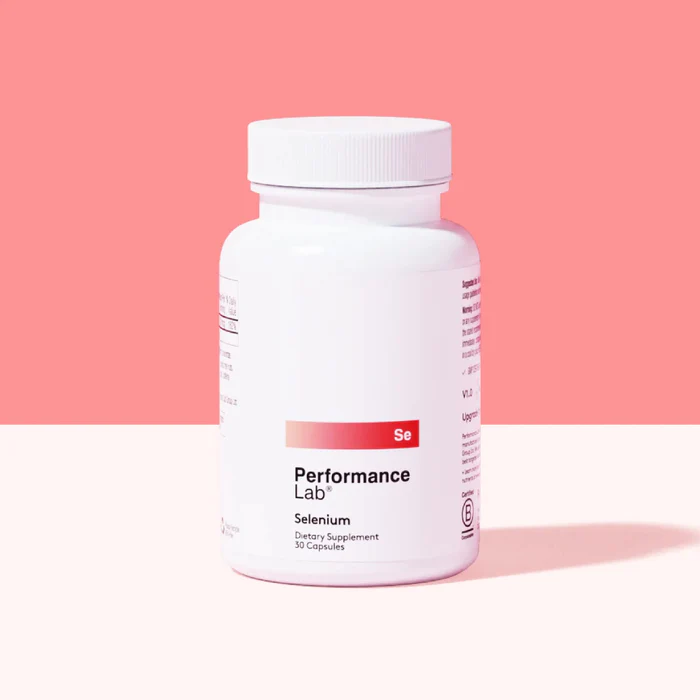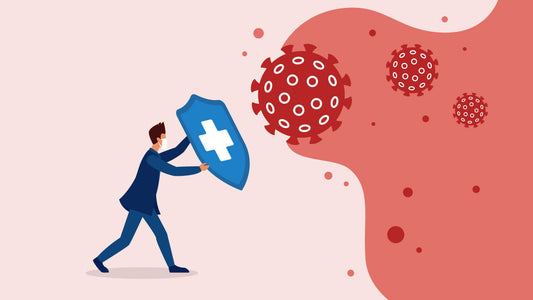As a vegan, you’ve probably heard—on several occasions—that you’re missing this nutrient, you’re low in that one, and whatever else people preconceive about nutrient deficiencies on a plant-based diet.
And while you can totally get enough of most essential nutrients on a vegan diet, there are some that you may be a little low in and perhaps need to supplement with.
One of those is selenium. It’s widely available in food sources and is a critical component of several body functions, so let’s talk about why you need selenium, the best sources for vegans, and how much is enough.
Key Takeaways
- Selenium is crucial for antioxidant defenses, thyroid hormone production, and immune health—but can be harder to get on a vegan diet.
- Plant-based sources include Brazil nuts, sunflower seeds, whole grains, legumes, and certain mushrooms, though selenium content varies with soil.
- Because of this variability, relying only on food can leave vegans at risk of low selenium intake.
- A well-formulated selenium supplement can provide consistent, reliable intake to back up a plant-based diet.
- Look for clean, vegan-friendly formulas with effective yet safe doses that complement—not replace—whole foods.

What Is Selenium?
It’s probably not one of the minerals making it on your list, and it’s the reason why more than 1 billion people worldwide are deficient in selenium.
Selenium is an essential mineral required for human health, and as a trace mineral is required in very small concentrations to make selenoproteins.
But it’s not an even playing field as far as selenium goes. When you’re consuming it from food sources, especially plant-based ones, the amount of selenium in food is dictated by a few factors:
- Soil quality
- Rainfall
- Evaporation
- pH levels
All of these factors affect the concentration of selenium in soil and thus the concentration of selenium in your food 1. And the biggest issue surrounding that is that certain parts of the world are more prone to selenium deficiency due to unideal environmental conditions.
That’s where supplementing comes in handy. It safeguards you against deficiencies when food quality isn’t always consistent or reliable.
Why Selenium Is Important
1. Immune Function
When you think about immune health, it’s usually vitamin C, vitamin D, and maybe some herbs that come to mind—not usually selenium.
However, studies suggest that selenium deficiency is associated with poor immune function due to the mineral’s presence in human immune tissues like the liver, spleen, and lymph nodes 2.
Lack of selenium impairs function of some of the most important immune cells, including B cells, T cells, lymphocytes, natural killer (NK) cells, and more, that are required for protecting your body against invading pathogens and viruses.
2. Reproduction
Where men’s health is concerned, selenium has long been the go-to supplement—apart from zinc. Selenium is required for proper sperm function; it contributes to the morphology of sperm, along with its growth, development, and motility 3.
Studies consistently find that men supplementing with selenium have better sperm motility and an increased chance of successful conception.
But it’s also required for testosterone biosynthesis, which is the hormone that defines manliness 2. With low levels of selenium and testosterone, you’re looking at low sex drive, hair loss, poor muscle development, fatigue, and infertility, among other things.
3. Mood and Cognitive Function
Ever thought selenium could break your mood and brain function? You bet it can! Traditionally it’s thought that things like omega-3s and vitamin D were critical for supporting mood and cognitive health (and they are), but a number of studies show that adequate selenium is important for the brain.
When deficient, the turnover rate of some neurotransmitters is altered 2. Other studies suggest that low levels of selenium in elderly people is associated with senility and accelerated cognitive decline.
And in terms of mood, studies find that low selenium status greatly increases the incidence of depression and other negative mood states like anxiety, confusion, and hostility 4. But when you supplement to correct deficiencies, you see significant improvements in mood.
4. Thyroid Health
Iodine and thyroid go hand in hand; you can’t have a healthy thyroid without sufficient iodine. But studies actually show that low selenium intake may compromise thyroid hormone-metabolism and both selenium and iodine deficiency exacerbate hypothyroidism 2.
That may be because selenium is needed for the conversion of T4 to its active form, T3. So, if you’re trying to keep your thyroid health up and maintain a healthy metabolism, getting sufficient selenium is non-negotiable.
5. Antioxidant Defenses
Of all the functions of selenium, this may be perhaps the most prominent. It serves as a hugely important component of some major antioxidant enzymes, including glutathione peroxidase (GPx), thioredoxin reductase (TrxR), and iodothyronine deiodinases (IDD) 5.
These enzymes protect cells from damage by free radicals (reactive oxygen species, ROS) that develop as a by-product of normal body metabolism, exercise, environmental pollutants, and the like, and contribute to oxidative stress. High levels of oxidative stress are a major underlying cause of several chronic diseases.
The Top 6 Vegan Sources Of Selenium
Now that you know why selenium is critical to good health, let’s talk about where you can find it.
As most of the best sources of selenium come from animal-based products, it can be challenging for vegans to get enough. To avoid deficiencies, ensure you’re consuming these foods daily:
1. Brazil Nuts
If there’s one source that tops that charts across the board for selenium, it’s Brazil nuts. They’re not usually the nut of choice for most people, but they are a powerhouse for this mineral.
Per 1 ounce of nuts (about 6 pieces), you’re looking at a whopping 544mcg of selenium 6. Just 3 Brazil nuts a day can keep your levels of selenium high.
2. Cereals and Grains
Brown rice and oats offer another awesome vegan source of selenium. They don’t rank anywhere near Brazil nuts, but one cup of brown rice offers nearly 10mcg of selenium, while one cup of dry oats offers about 24mcg 7, 8.
3. Lentils
Rice and beans not only make a complete protein, but they also offer a punch towards your daily dose of selenium. One cup of cooked lentils offers 6mcg of selenium 9. And if you want to boost it further, opt for baked beans instead of lentils. They provide around 13mcg per cup 10.
4. Sunflower Seeds
Sunflower seeds are a huge nutritional powerhouse. They’re not only packed full of healthy fats and protein, but a one-third cup serving offers a massive 25mcg of selenium 11!
Throw them in a salad, make a trail mix, bake granola (and add those oats!), or eat them straight up.
5. Performance Lab Immune

Immune is more than just your typical immune supplement. It combines six powerful ingredients to deliver true broad-range support. It restores and maintains vitamins, minerals, and antioxidants critical to proper immune function.
And the selenium in Immune isn’t your standard run of the mill. It’s NutriGenesis selenium designed for maximum bioavailability and use. It supports a healthy immune system and strengthens natural defenses in two ways:
- Helps form glutathione — Selenium’s glutathione support teams up with Immune L-Glutathione, resulting in 2X immune-defending super-antioxidant activity
- Regulates immune cell activity via selenoproteins that are required for healthy production, function, and activity of immune T-cells and NK cells
With the high prevalence of selenium deficiency, Immune includes selenium to help restore ideal levels required for robust immune system performance.
6. Performance Lab NutriGenesis Multi

One of the best ways to safeguard yourself against any nutritional deficiencies is with a top-tier multivitamin. But leave the standard brands on the shelf and opt for something that actually works.
Performance Lab NutriGenesis Multi for Men and Multi for Women is like no other multi you’ve seen.
It contains 17+ essential daily vitamins and minerals—including 125mcg (227% RDA) of selenium—complexed with natural cofactors like probiotics, fiber, enzymes, and antioxidants that enhance bioavailability and health-supportive activity. It’s an ultramodern multivitamin for overall health and peak human performance.
How Much Selenium Do You Need?
When it comes to selenium, more isn’t necessarily better. The recommended daily intake is 55mcg daily for individuals 14 years and older, with a tolerable upper intake limit of 400mcg per day.
You can typically get enough selenium through diet to negate the need for a selenium supplement, but for people living in regions where soil concentration is poor or following a plant-based diet, supplementation may be required.
For people who aren’t getting enough selenium from diet and aren’t supplementing to protect themselves, some of the most common symptoms you may experience include:
- Infertility
- Muscle weakness
- Fatigue
- Brain fog
- Weakened immune system
However, keep in mind that selenium toxicity is a thing. It occurs with acute or chronic ingestion of excess selenium and results in things like nausea and vomiting, nail discoloration and brittleness, hair loss, fatigue, irritability, and ‘garlic breath’ 12.
Final Thoughts
Whether it’s supporting immune function, thyroid health, reproduction, or the antioxidant defense system, there’s no doubt that selenium plays a key role within the body.
But for a mineral that’s so widely deficient among the population, getting all your selenium from food can be really challenging—especially as a vegan.
In cases where food sources just aren’t enough, supplementing with Performance Lab Immune or NutriGenesis Multi can help prevent deficiencies and keep your organ systems in tip-top shape.
They’re ultra-modern supplements to support all-around optimal performance and function.
References
- GD Jones, B Droz, P Greve, et al. Selenium deficiency risk predicted to increase under future climate change.Proc Natl Acad Sci US 2017;114(11):2848-2853.
- MP The importance of selenium to human health. Lancet. 2000;356(9225):233-241.
- R Scott, A MacPherson, RW Yates, B Hussain, J The effect of oral selenium supplementation on human sperm motility.Br J Urol. 1998;82(1):76-80.
- D Benton, R The impact of selenium supplementation on mood.Biol Psychiatry. 1991;29(11):1092-1098.
- U Selenium: its role as antioxidant in human health. Environ Health Prev Med. 2008;13(2):102-108.
- https://fdc.nal.usda.gov/fdc-app.html#/food-details/170569/nutrients
- https://fdc.nal.usda.gov/fdc-app.html#/food-details/173263/nutrients
- https://fdc.nal.usda.gov/fdc-app.html#/food-details/173904/nutrients
- https://fdc.nal.usda.gov/fdc-app.html#/food-details/172421/nutrients
- https://fdc.nal.usda.gov/fdc-app.html#/food-details/175182/nutrients
- https://fdc.nal.usda.gov/fdc-app.html#/food-details/170562/nutrients
- JK MacFarquhar, DL Broussard, P Melstrom, et al. Acute selenium toxicity associated with a dietary supplement.Arch Intern Med. 2010;170(3):256-261.
















